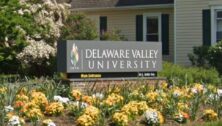Teachers at Abington Friends School Create Exciting Experiences for Students During Pandemic

The COVID-19 pandemic has changed many different aspects of life, one in particular being education. However, teachers at Abington Friends School are taking a challenging situation and in turn giving their students new and exciting experiences in their classrooms.
Preexisting small class sizes and both interior and exterior space allowed the AFS campus to reopen in phases, beginning on Aug 31 with early childhood and elementary school. In total, 85 percent of the school’s student body has elected to attend in-person class with firm policies for the community on social distancing, mask wearing and daily health screenings.
Most classes are being taught entirely in person, only in smaller cohorts, and the high school students are physically on campus on alternate days of the week. These upper grades spend Wednesdays learning from home, participating in clubs and activities, Meeting for Worship and Conscious Community programming focused on social justice and inclusivity.
There are a number of classes that are completely online, whereas others are mixed, with some students in class and some tuning into the classroom via Zoom. “The students have been so resilient and so willing to dive into this new normal,” said Lisa Ammirati, a high school science teacher. “They’re eager to try things that are entirely new and that’s made our jobs easier: their willingness to take risks and to try things.”
Communication has been key at AFS since the start of the pandemic. Already at AFS is a deep level of collaboration between faculty members across all divisions – upper, middle and lower schools – that high school history teacher Margaret Guerra finds to be atypical compared to other schools.
“When we went online [for a period in the spring], it was so very isolating at first,” said Guerra. “Everybody was in lockdown. So even in March and April, we were thinking about how we could communicate and work together effectively.”
Guerra, along with Ammirati, high school English teacher Sheila Pai, Dean for International Students Tina Yen, and robotics and math teacher Jillian Ma, all attended the Global Online Academy, through which they gained a knowledge of navigating education in the virtual world and tools to help do so.
After attending the Academy, the teachers shared their knowledge with AFS faculty across the divisions, collaborating on best practices for engaging students at home and at school. The entire faculty body at AFS spent the summer in planning mode, collaborating, troubleshooting technology and seeking feedback and ideas from their colleagues.
Strength in communication during the pandemic has gone beyond the faculty. Teachers have also been reaching out to students for their honest feedback, and even parents of students, to ensure the most intentional and effective experience possible.
“That’s why we’re here, to serve the students,” said Sunshine O’Donnell, who is co teaching Middle School History and English with Erin Timmer. “If we don’t check in about the experience they’re having, we are doing a disservice.”
Keisha Hirlinger, who transitioned from teaching music, and Michelle Podulka are co-teaching the fourth grade class all online. The two have experience collaborating together that stretches before the start of the pandemic in professional development, specifically designing workshops that focus on diversity, equity and inclusion.
The teaching duo, as well as every other teacher at AFS, have made it a priority to check in with students and their parents and make changes to their classes accordingly.
“We feel and hope we have the trust of the families that we really are putting their children at the center,” said Hirlinger.
Extremely important at AFS and within a Quaker school setting is making sure the students feel seen, heard and loved, especially during this challenging time. The foundations of a strong academic program are made sturdier by rebuilding this culture and helping students feel like they are still a part of a caring and supportive community. This has been a major challenge teachers at AFS have faced in the world of virtual or socially distanced education.
Raji Malik, a kindergarten teacher with an in-person/virtual hybrid class, goes above and beyond to ensure his virtual students feel as included as the students who are physically in the classroom. Malik shared “In class, I have a little microphone and whenever someone wants to say something, they walk up to the microphone and are looking at the computer, so they are basically talking to the two kids who are on the computer to make them feel like we are all in school together.”
Though this situation is not anyone’s first choice, and while it has presented unique challenges, teachers at AFS share a sense of hope that there might be some positive, lasting impacts coming out of the pandemic. Students are becoming better problem solvers, are learning patience and stillness, and are finding a deeper sense of gratitude for things that were taken for granted before the pandemic.
“The philosophy is what are we getting out of this? instead of what are we losing from this?,” said Guerra.
Learn about the community and culture of Abington Friends School, a pre-K through Grade 12 college preparatory, coeducational, Quaker school by registering for their Virtual Open House this Saturday, Oct 17 at 1 p.m.
Stay Connected, Stay Informed
Subscribe for great stories in your community!
"*" indicates required fields









![ForAll_Digital-Ad_Dan_1940x300[59]](https://montco.today/wp-content/uploads/sites/2/2022/06/ForAll_Digital-Ad_Dan_1940x30059.jpg)

![95000-1023_ACJ_BannerAd[1]](https://montco.today/wp-content/uploads/sites/2/2023/03/95000-1023_ACJ_BannerAd1.jpg)
































